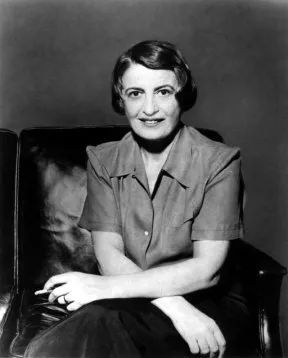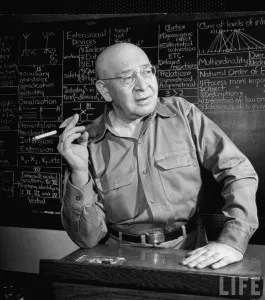Rand & Korzybski: Objectivism and General Semantics
Recently, two deep philosophers came into my view. I enjoy both of their work, but I find it interesting that they have seemingly opposite philosophies. In reality, someone could write a freaking BOOK on these two people having a conversation, so please join in on the conversation, and help me comprehend these impactful thinkers!
Ayn Rand

Rand seems to scare many people. Mother of objectivism, she believes that selfishness as a moral virtue. Especially when in my liberal college, people didn't like the idea of selfishness, which Rand rewords self-esteem. She has many lovely things to say about bringing one's own happiness as focus in life. I like looking at her philosophy like self-love, and less like narcissism. Her interest in the free market inspired people to feel a bit more skeptical of what the state does. Also, increasing one's own responsibility encourages a strong step from dependence to independence. Acting as a moral judge, and having no fear to make a judgement can really help people gain self-confidence. Atlas Shrugged will exist as classic for awhile, yet the criticism will keep rolling in.
"There are two sides to every issue: one side is right and the other is wrong, but the middle is always evil." - Ayn Rand
Alfred Korzybski

"Whatever you say it is, it isn't." Alfred Korzybski
Rand's philosophy of objectivism seems a bit "two-valued" for Korzybski, as he favors Non-Aristoliean thinking. Less known by the mainstream, Alfred Korbyski developed the field General Semantics. His magnum opus, Science and Sanity (which I have just scratch the surface of) ignited some very unique conversation, and such a wide range of fields, from mathematics to anthropology.
Honestly, I have only came across General Semantics about 3 months ago. I have used it before, since Korzybski's work has trailed down into many others. I've recognized that many self-help book comes from Korzyski's work, eventually turning into things like Neuro-linguistic Programming (NLP) or Non-Violent Communication (Take a look at the similarities with E-Prime). The first time I found the idea "the map is not the territory" in Stephen Covey's 7 Habits of Highly Effective People, .
Add to the Conversation!
So, these books inspire many different types of people. I will boldly claim that together they did not miss a single person that couldn't use their work. I find it amazing that both created a whole field of thought. Both truly inspiring, yet I feel that there could exist a marriage of thought.
Unfortunately I lack the time to fully hash out my thoughts, but I thought I bring this to community! What would they say to each other? What similarities and differences do they both have? Do I compare apples and oranges? What if they had a baby? Thoughts? Feelings? Corrections? Additions? Let's collaborate!
(I enjoy the look of black & white photos of people smoking cigarettes, but personally find smoking disgusting)